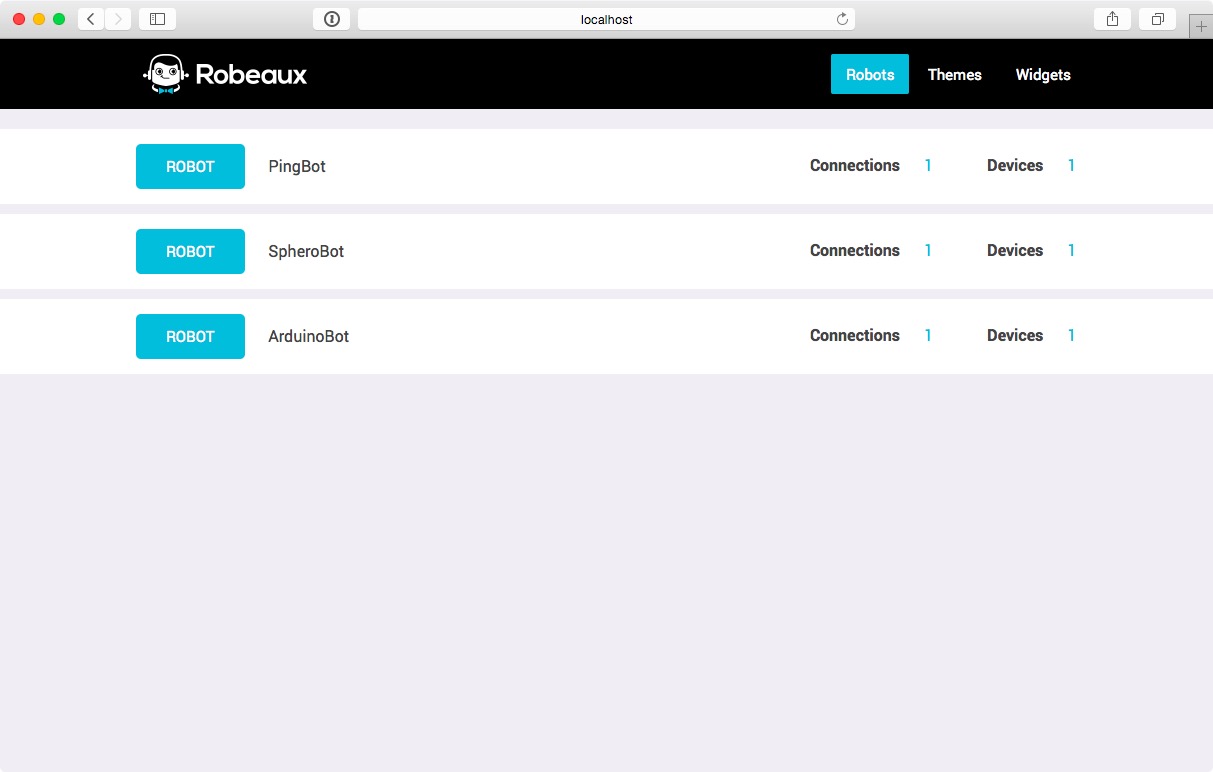Cylon.js is a JavaScript framework for robotics, physical computing, and the Internet of Things (IoT).
It provides a simple, but powerful way to create solutions that incorporate multiple, different hardware devices concurrently.
Want to use Node.js for robots, drones, and IoT devices? You are in the right place.
Want to use Ruby on robots? Check out our sister project, Artoo.
Want to use Golang to power your robots? Check out our sister project, Gobot.
All you need to get started on a new robot is the cylon module:
npm install cylon
With the core module installed, now install the modules for whatever hardware
support you need. For the Arduino + LED blink example, we'll need the firmata, gpio, and i2c modules:
npm install cylon-firmata cylon-gpio cylon-i2c
The below example connects to an Arduino over a serial connection, and blinks an LED once per second.
The example requires that the Arduino have the Firmata sketch installed; which
can be obtained either through the Ardunio IDE or the gort arduino upload firmata command available in gort.
var Cylon = require('cylon');
// define the robot
var robot = Cylon.robot({
// change the port to the correct one for your Arduino
connections: {
arduino: { adaptor: 'firmata', port: '/dev/ttyACM0' }
},
devices: {
led: { driver: 'led', pin: 13 }
},
work: function(my) {
every((1).second(), my.led.toggle);
}
});
// connect to the Arduino and start working
robot.start();var Cylon = require('cylon');
Cylon.robot({
connections: {
ardrone: { adaptor: 'ardrone', port: '192.168.1.1' }
},
devices: {
drone: { driver: 'ardrone' }
},
work: function(my) {
my.drone.takeoff();
after((10).seconds(), my.drone.land);
after((15).seconds(), my.drone.stop);
}
}).start();var Cylon = require('cylon');
Cylon.robot({
connections: {
digispark: { adaptor: 'digispark' },
leapmotion: { adaptor: 'leapmotion' }
},
devices: {
servo1: { driver: 'servo', pin: 0, connection: 'digispark' },
servo2: { driver: 'servo', pin: 1, connection: 'digispark' },
leapmotion: { driver: 'leapmotion', connection: 'leapmotion' }
},
work: function(my) {
my.x = 90;
my.z = 90;
my.leapmotion.on('hand', function(hand) {
my.x = hand.palmX.fromScale(-300, 300).toScale(30, 150);
my.z = hand.palmZ.fromScale(-300, 300).toScale(30, 150);
});
every(100, function() {
my.servo1.angle(my.x);
my.servo2.angle(my.z);
console.log(my.servo1.currentAngle() + ", " + my.servo2.currentAngle());
});
}
}).start();To use the HTTP API plugin, first install it's NPM module:
$ npm install cylon-api-http
Then it can be used in scripts:
var Cylon = require('cylon');
// tell the HTTP API plugin to listen for requests at https://localhost:4000
Cylon.api("http", { port: 4000 });
var bots = [
{ port: '/dev/rfcomm0', name: 'Thelma' },
{ port: '/dev/rfcomm1', name: 'Louise' }
];
bots.forEach(function(bot) {
Cylon.robot({
name: bot.name,
connections: {
sphero: { adaptor: "sphero", port: bot.port }
},
devices: {
sphero: { driver: "sphero" }
},
work: function(my) {
every((1).second(), function() {
console.log(my.name);
my.sphero.setRandomColor();
my.sphero.roll(60, Math.floor(Math.random() * 360));
});
}
});
});
// start up all robots at once
Cylon.start();For those more familiar with jQuery, D3, or other fluent-style JavaScript libraries, Cylon.JS also supports a chainable syntax:
var Cylon = require('cylon');
Cylon
.robot()
.connection('arduino', { adaptor: 'firmata', port: '/dev/ttyACM0' })
.device('led', { driver: 'led', pin: 13 })
.on('ready', function(bot) {
setInterval(function() {
bot.led.toggle();
}, 1000);
});
Cylon.start();Cylon.js has an extensible syntax for connecting to multiple, different hardware devices. The following 36 platforms are currently supported:
Our implementation of GPIO (General Purpose Input/Output) allows for a shared set of drivers supporting 14 different devices:
- GPIO <=> Drivers
- Analog Sensor
- Button
- Continuous Servo
- Direct Pin
- IR Range Sensor
- LED
- Makey Button (high-resistance button like the MakeyMakey)
- Maxbotix Ultrasonic Range Finder
- Motor
- Relay
- RGB LED
- Servo
- Temperature Sensor
- TP401 Gas Sensor
We also support 14 different I2C (Inter-Integrated Circuit) devices
through a shared cylon-i2c module:
- I2C <=> Drivers
- BlinkM RGB LED
- BMP180 Barometric Pressure + Temperature sensor
- Direct I2C
- HMC6352 Digital Compass
- JHD1313M1 LCD with RGB Backlight
- LCD
- LIDAR-Lite
- LSM9DS0G 9 Degrees of Freedom IMU
- LSM9DS0XM 9 Degrees of Freedom IMU
- MAG3110 3-Axis Digital Magnetometer
- MPL115A2 Digital Barometer & Thermometer
- MPU6050 Triple Axis Accelerometer and Gyro
- PCA9544a 4-Channel I2C Mux
- PCA9685 16-Channel 12-bit PWM/Servo Driver
In addition to our officially supported platforms, we have the following 8 user contributed platforms:
We'll also have many more platforms and drivers coming soon, follow us on Twitter for updates.
Cylon.js can be run directly in-browser, using the browserify NPM module.
You can also run it from withing a Chrome connected app, or a PhoneGap mobile app.
For more info on browser support, and for help with different configurations, you can find more info in our docs.
Cylon.js has support for different API plugins that can be used to interact with your robots remotely. At this time we have support for http/https, mqtt, and socket.io with more coming in the near future.
To use an API plugin, install it alongside Cylon:
$ npm install cylon-api-http cylon-api-socketio
Then, all you need to do is call Cylon#api in your robot's script:
var Cylon = require("cylon");
// For http
Cylon.api('http');
// Or for Socket.io
Cylon.api('socketio');Then visit https://localhost:3000/ and you are ready to control your robots from a web browser!
You can check out more information on the Cylon API in the docs here.
Cylon uses the Gort http://gort.io Command Line Interface (CLI) so you can access important features right from the command line. We call it "RobotOps", aka "DevOps For Robotics". You can scan, connect, update device firmware, and more!
Cylon also has its own CLI to generate new robots, adaptors, and drivers. You can check it out at https://github.com/hybridgroup/cylon-cli.
We're busy adding documentation to our website, check it out at cylonjs.com/documentation.
If you want to help with documentation, you can find the code for our website at on the https://github.com/hybridgroup/cylon-site.
For our contribution guidelines, please go to CONTRIBUTING.md.
For the release history, please go to RELEASES.md.
Copyright (c) 2013-2016 The Hybrid Group. Licensed under the Apache 2.0 license.




